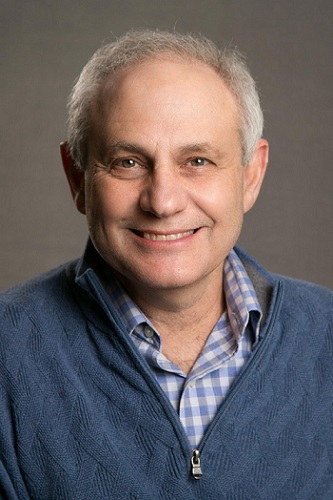ECOG-ACRIN Cancer Research Group melanoma research team led by Michael Atkins, MD, receives the 2023 Paper of the Year distinction from the Journal of Clinical Oncology

The DREAMseq trial results had the greatest impact and reach among all the journal's papers in 2023
A team of melanoma researchers with the ECOG-ACRIN Cancer Research Group (ECOG-ACRIN) is honored with the 2023 Paper of the Year distinction by the Journal of Clinical Oncology. The recognition is for the results of the DREAMseq randomized phase 3 clinical trial. DREAMseq (EA6134) showed an optimal treatment sequence for combination therapy in patients with advanced melanoma with a BRAFV600 tumor gene mutation. The treatment sequence beginning with immunotherapy (nivolumab and ipilimumab), followed by targeted therapy (dabrafenib and trametinib) if there was disease progression, resulted in a 20% absolute improvement in 2-year overall survival (72% vs 52%) compared with the sequence beginning with dabrafenib and trametinib.
 "When the results of the DREAMseq trial emerged, they had an immediate impact on clinical practice because
these are FDA-approved regimens," said lead researcher Michael B. Atkins, MD, a medical oncologist at
Georgetown University Lombardi Comprehensive Cancer Center and a member of the ECOG-ACRIN
Melanoma Committee (pictured).
"When the results of the DREAMseq trial emerged, they had an immediate impact on clinical practice because
these are FDA-approved regimens," said lead researcher Michael B. Atkins, MD, a medical oncologist at
Georgetown University Lombardi Comprehensive Cancer Center and a member of the ECOG-ACRIN
Melanoma Committee (pictured).
Journal editors selected Dr. Atkins and the ECOG-ACRIN-led DREAMseq team (acknowledged below) based on the overall impact and reach of trial results. The Journal of Clinical Oncology (JCO) is the flagship publication of the American Society of Clinical Oncology (ASCO).
"After years of research, many exciting and effective new combination treatments exist for patients with advanced melanoma," said Dr. Atkins. “Further, the use of one treatment can affect a patient's response to another treatment. Consequently, patients and their physicians often find themselves with multiple treatment options but few answers to questions surrounding how and when to use these approved approaches."
JCO Associate Editor Gary K. Schwartz, MD, wrote: "The optimal sequence of targeted molecular therapy versus checkpoint inhibitor immunotherapy as first-line treatment for patients with BRAFV600-mutant metastatic melanoma has represented a major therapeutic challenge. This study addresses this issue and settles this question by showing that immunotherapy should precede targeted therapy as the first-line treatment for patients with BRAFV600 metastatic disease."
More discoveries will emerge from DREAMseq, as Dr. Atkins and colleagues are now validating biomarker findings from biopsy tissue and blood samples contributed by trial participants.
Dr. Atkins stated that "the goals of these biomarker studies are to identify at a molecular level the subset of patients who benefit from starting with targeted therapy and those who don’t appear to benefit from either treatment approach and thus would be candidates for alternative therapies.”
ECOG-ACRIN designed and conducted the DREAMseq trial, spearheading an extensive collaboration across multiple cancer centers, community hospitals, and sister cooperative groups in the U.S. These include the Alliance for Clinical Trials in Oncology, NRG Oncology, and SWOG Cancer Research Network. The National Cancer Institute, part of the National Institutes of Health, funded the endeavor through its National Clinical Trials Network.
Acknowledged below are the co-authors of Combination Dabrafenib and Trametinib Versus Combination Nivolumab and Ipilimumab for Patients With Advanced BRAF-Mutant Melanoma: The DREAMseq Trial—ECOG-ACRIN EA6134 (Atkins MD. J Clin Oncol. January 2023), along with their institutional affiliation:
Michael B. Atkins, MD1
Sandra J. Lee, ScD2
Bartosz Chmielowski, MD3
Ahmad A. Tarhini, MD, PhD4
Gary I. Cohen, MD5
Thach-Giao Truong, MD6
Helen H. Moon, MD7
Diwakar Davar, MD8
Mark O'Rourke, MD9
Joseph J. Stephenson, MD9
Brendan D. Curti, MD10
Walter J. Urba , MD, PhD10
Joanna M. Brell, MD11
Pauline Funchain, MD12
Kari L. Kendra , MD, PhD13
Alexandra P. Ikeguchi, MD14
Anthony Jaslowski, MD15
Charles L. Bane, MD16
Mark A. Taylor, MD17
Madhuri Bajaj, MD18
Robert M. Conry, MD19
Robert J. Ellis, MD20
Theodore F. Logan, MD21
Noel Laudi, MD22
Jerey A. Sosman, MD23
David G. Crockett, MD24
Andrew L. Pecora, MD25
Ian J. Okazaki, MD26
Sowjanya Reganti, MD27
Sunandana Chandra, MD, MS23
Samantha Guild, JD28
Helen X. Chen, MD29
Howard Z. Streicher, MD29
Jedd D. Wolchok, MD, PhD30
Antoni Ribas, MD, PhD3
John M. Kirkwood, MD8
1 Georgetown Lombardi Comprehensive Cancer Center, Washington, DC
2 Dana-Farber Cancer Institute and Harvard Medical School, Boston, MA
3 Jonsson Comprehensive Cancer Center, University of California Los Angeles, Los Angeles, Los Angeles, CA
4 H. Lee Mott Cancer Center and Research Institute, Tampa, FL
5 Greater Baltimore Medical Center, Baltimore, MD
6 Kaiser Permanente Northern California, Vallejo, CA
7 Kaiser Permanente Southern California, Riverside, CA
8 Hillman Cancer Center and University of Pittsburgh, Pittsburgh, PA
9 Greenville Health System Cancer Institute, Greenville, SC
10 Providence Cancer Institute, Portland, OR
11 MetroHealth Cancer Center, Case Western Reserve University, Cleveland, OH
12 Cleveland Clinic Taussig Cancer Center, Cleveland, OH
13 Ohio State University Comprehensive Cancer Center, Columbus, OH
14 University of Oklahoma Medical Center, Oklahoma City, OK
15 Saint Vincent Hospital Cancer Center at Saint Mary's, Green Bay, WI
16 Dayton Physicians LLC-Atrium, Dayton, OH
17 Lewis Ca & Res Pavilion at Saint Joseph's/Candler, Savannah, GA
18 Illinois CancerCare-P.C., Peoria, IL
19 University of Alabama at Birmingham, Birmingham, AL
20 CoxHealth South Hospital, Springeld, MO
21 Indiana University Melvin and Bren Simon Comprehensive Cancer Center, Indianapolis, IN
22 Mercy Hospital, St Louis Park, MN
23 Robert H. Lurie Comprehensive Cancer Center of Northwestern University, Chicago, IL
24 Nebraska Cancer Specialists, Grand Island, NE
25 John Theurer Cancer Center, Hackensack, NJ
26 Straub Medical Center—Kahului Clinic, Honolulu, HI
27 Renown Regional Medical Center, Reno, NV
28 AIM at Melanoma Foundation, Richmond, CA
29 Cancer Therapy Evaluation Program, Division of Cancer Treatment and Diagnosis, National Cancer Institute, Bethesda, MD
30 Memorial Sloan Kettering Cancer Center and Weill Cornell Medical College, New York, NY
